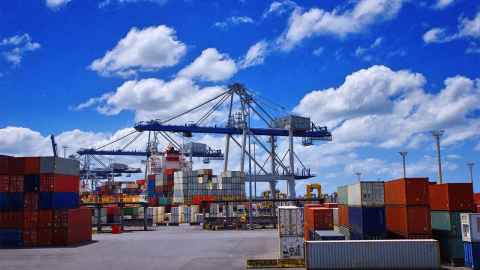What the pandemic means for our SMEs
24 September 2020
Opinion: One silver lining to the Covid pandemic is that small and medium-sized firms are now effectively 'on notice' as to risk. Bridgette Sullivan-Taylor explains.

As we re-emerged from our second lockdown, businesses had to again reflect on their resilience in the face of global supply chain vulnerabilities.
New Zealand’s small, isolated, economy relies heavily on exports and imports and therefore increasingly on global supply chains. Notably, tourism, education and primary industries depend on the flow of goods, services and people across borders. We are also a nation of small to medium enterprises (SMEs): 97 percent of businesses by the standard national measure of having fewer than 20 employees. So what hurts New Zealand’s overseas suppliers or consumers therefore hurts its SMEs.
SMEs have both special vulnerabilities and certain advantages regarding international supply chains. One obvious vulnerability is the lack of resources and technical capacity and capability. Moreover, SMEs often fail to consider how their supply chains will allocate risk, especially if these are out of sight overseas and so relatively out of mind. Managerial attitudes and culture do not always help either. On the other hand, SMEs are famously agile and quick to adapt.
We do not know exactly how far and for how long supply chains in or out of New Zealand will be impacted by Covid-19. Air travel has largely ceased bringing people into the country. Many businesses and governments of our trading partner nations are acutely aware of the risks of cutting supply chains at least for necessities, and have every economic incentive to keep them open for as many types of goods and services as possible.
One thing for sure, though, is this pandemic is unprecedented and has demanded swift, coordinated action. Its economic and social implications are being addressed with equally unprecedented stimulus packages in most jurisdictions that can – for the meanwhile, and barely – afford them.
The New Zealand Government has released support to cushion the economic blow but each day still brings more reports of actual or looming business closures, both large and small.
But predictions of recession, or more likely depression, worldwide remain extremely serious and long-lasting for the whole economy. Even if apps and other technology allow a less cruel trade-off between risk to human life and the health system on the one hand, with SMEs and other businesses on the other, until some efficacious treatment such as a hoped-for vaccine eventuate, lockdowns of various degrees are likely to persist globally, suppressing both demand and supply with extensive ripple effects.
Among our SMEs’ exports, necessities might presumably suffer less than luxuries. Luxuries requiring air freight, like small businesses exporting oysters or fresh-cut flowers, must be especially hard-hit at least right now, whereas family farm SMEs producing basic food would be doing better provided they can source inputs.
If international supply chains fail to either hold up or re-form, one drastic long-term response would be unwinding or deglobalising at least some supply chains. Think patriotic green 'locavores' somehow replacing food export markets; or domestic holidaymakers filling the shoes of foreign tourists as Kiwis who would have vacationed overseas travel domestically instead.
One can only imagine that deglobalising supply chains would require remarkable change and sacrifice. It would insulate but also isolate us and cripple certain industries. Nevertheless, if supply chains deglobalised, one argument goes, the euphemistically termed 'creative destruction' could foster some new sectors and some new SMEs would no doubt form to meet demand that could not be satisfied from overseas, or create new demand. At the same time some existing SMEs, with that famous agility, might radically adapt and re-form.
Deglobalisation could also be a drastic way of mitigating climate change, albeit ironic that overdue preparation for such an extreme-probability, high-impact event would have been sparked by a very low-probability, high-impact 'black swan' event like the pandemic.
Others are suggesting the pandemic could jolt us into positive changes against future risks without sacrificing all the huge and accustomed benefits of worldwide supply chains. One such positive would be global cooperation against global risks like future pandemics or, again, the less sudden and spectacular but more existential global risk – indeed certainty – of climate change.
As to financial relief at the moment and in future, SMEs’ insurers, already pulling back from underwriting looming climate change costs and other contingent liabilities, will be stretched. Moreover, future government-provided disaster relief may be fiscally constrained by the apparently inevitable recession. Eventually we and other countries will go back to business to some extent, in some new normal, and in our case probably mostly in SMEs since that is so far the Kiwi way.
Regardless of the pathway and exact outcomes of this disaster, surely a necessary resilience response and one silver lining to this very dark cloud, is that small and medium-sized firms are now effectively 'on notice' as to risk.
The key will be to prepare for a broad range of risks of the kind that we and other colleagues have written about elsewhere and for a repeat of the same kind of threat, namely a pandemic, which is top of mind but not necessarily the top threat long-term.
Dr Bridgette Sullivan-Taylor is a risk management specialist in the Business School.
This article reflects the opinion of the author and not necessarily the views of the University of Auckland.
Used with permission from Newsroom What the pandemic means for our SMEs 24 September 2020.
Media queries
Alison Sims | Research Communications Editor
DDI 09 923 4953
Mob 021 249 0089
Email alison.sims@auckland.ac.nz